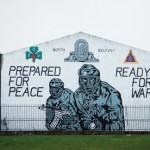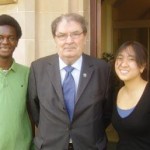Here’s a repost of an article about the Northern Ireland Semester that appeared in the July 2008 issue of the Swarthmore College Bulletin.
By Carol Brévart-Demm
Maurice Weeks (left) and Reina Chano (right) met 1998 Nobel Peace Prize winner John Hume.
Although Chano and Weeks each took two courses at the University of Ulster and attended additional lectures organized by Crossan, their placements in community organizations were the focus of their activities in Northern Ireland.
Chano worked with the Verbal Arts Centre, an educational charity group that sponsors a variety of programs, all centered on providing Northern Ireland communities with a safe place and space to “tell your story.” She assisted with the Centre’s community relations programs for young children from segregated schools, aimed at confronting the differences among and between Catholics/Nationalist/Republicans and Protestant/Unionists/Loyalists and encouraging children to interact, work together, and learn from each other. She has been designing a new community relations curriculum whose pilot program has been very successful, she says. “As someone with a growing interest in education, it has been an incredibly rewarding and challenging experience. Absolutely great craic!” She explains that craic means “good-natured Irish fun.”
Weeks worked with the Holywell Trust, an organization seeking to foster peace-building through healing, understanding, and cooperation. He undertook, among other activities, a project on immigrants in Derry: “The immigration population, especially from Eastern Europe, has greatly increased with the introduction of expanded European Union working provisions. Some groups of immigrants have expressed difficulties living in Northern Irish society.” Weeks was delighted when a local community worker offered to help him organize focus groups and interviews. “It’s amazing how open he was to my research plan,” Weeks says.
“From a Peace and Conflict Studies perspective, it’s interesting to be participating in the transition process, where a lot of the legacies of the Troubles have to be dealt with and yet, it’s a kind of model of conflict transformation,” Smithey says.

